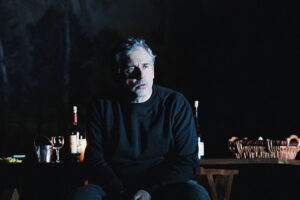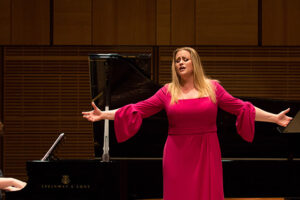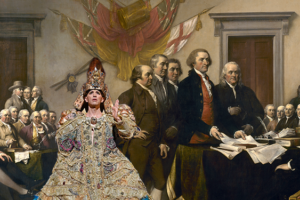

A role like Manon requires keen flexibility—the soprano must manage the fantastic leaps the character undertakes between parochial innocence, urbane sophistication, and despair. In the past, I have loved Netrebko’s conviction and fearlessness—sometimes verging on the edge of a campy dream, singular in personality, bombastic, and indulgent in the best possible way.
However, her Manon revealed a musician and actress whose technique is as formidable as her heart. Emotional, vocally resplendent, and committed dramatically, Netrebko brought her unique vitality to the role. In fact, Netrebko’s undertaking of Manon felt historic, full-throttled and gutsy, with her trademark old-school voluptuousness.
Manon Lescaut’s narrative investigates the pressures of patriarchy on female subjectivity. Not exactly a feminist text, the opera nevertheless makes a case for liberation politics through its depiction of female objectivity and suppression. And yet, the opera fails to offer (thankfully) any prescriptive agenda. The result is an experience that troubles through its ambivalence, enacting on its protagonist the lose-lose constraints of patriarchy.
Manon careens wildly between the feminine archetypes favored by patriarchy—beginning as a young, fresh county girl (the virgin), morphing into to a femme fatale of Parisian society (the whore), and expiring in desperation, exiled and forgotten (the martyr—“Sola, perduta, abbandonata” indeed). It’s likely Puccini did not intend for his opera to be read in such a manner—in fact, the novel by Abbé Prévost upon which the piece is based, has been widely interpreted as a warning to the young women of his period. However, where Manon Lescaut works so wonderfully is in the moments in which it undermines its own sense of morality, highlighting the systemic misogyny that both elevates and shatters women.
Marcello Álvarez served a consistent counterpoint to Netrebko’s versatile Manon, as Des Grieux, though his role calls for far less variation. His interpretation of the character seemed relatively naïve—a brave little fool, overwhelmed in the face of such epic sadness. But what other kind of man follows his lover into the despair of Louisiana?
While much is made of Manon’s fresh-faced innocence within the opera, the key to Des Grieux’s tragedy is that he is just as unworldly as Manon, unsophisticated regarding the extent of suffering one might bear for love. The tenor’s aggressive singing amplified this mock-heroism, with a robust, romantic, and secure performance, especially during the famous “Donna non vidi mai.”

Brindley Sherratt was appropriately menacing as Geronte di Ravoir, cold and reptilian in his depiction of moneyed sexism. While other singers might force a bumbling silliness on the character (almost like a lighted-hearted version of Death in Venice’s Aschenbach) Sherratt allowed the character to embody a dangerous guile.
Whether or not these thoughtful performances redeem the scattered, detached effects of the production’s staging is a difficult conclusion to determine. So much of Eyre’s direction seems thoughtless. Most saliently, I spent much of the evening trying to figure out why the plot has been updated to 1941, though there seem to be no overt references to occupied France. Perhaps the soldiers are meant to be Nazis? And yet, there are no Swastikas or other Nazi references to make this idea explicit.
In the third act, as the various women are called forward to be deported, they are dressed like hopefuls at an open call for a regional production of Gypsy. Moreover, they are directed into various sight gags that play uncomfortably into caricatures of sex workers. Besides being distasteful and completely uninteresting, this business is insulting to the historical realities of women. This moment, one of the most disturbing within the opera, has the potential to complicate and broaden Manon’s pathos. Instead, it was utilized for laughs.
In retrospect, the production in general seems a lost opportunity. Our national community (not to mention our Global one as well) is currently embroiled in the rhetoric and discourse of alterity—specious accusations towards certain populations (by elected officials, nonetheless) regarding their supposedly noxious effects on the economic and cultural health of our troubled country; not to mention, there have been a large rash of awful hate crimes within the last week.
Indeed, I would be remiss if I were to forget that Manon is deported as an undesirable. With this thought in mind—why remove the tragedy of Manon Lescaut to the 1940s? It almost seems irresponsible to distance these experiences so pointlessly, when it would be more effective to update the opera to a contemporary setting; the truth is that we are living these terrifying notions today.
Photos: Ken Howard/Metropolitan Opera























Comments